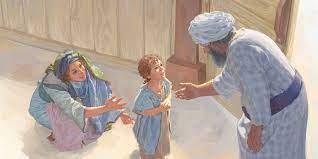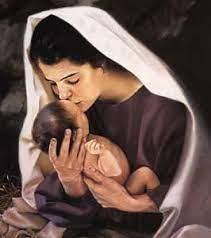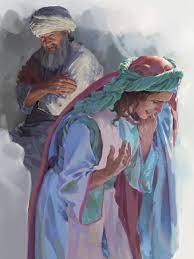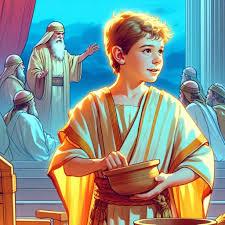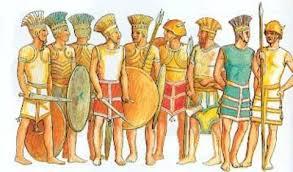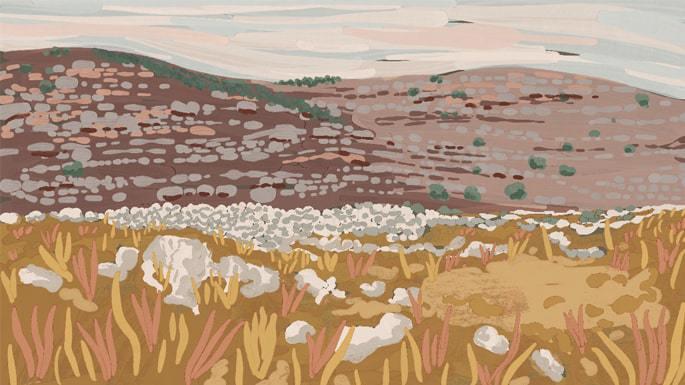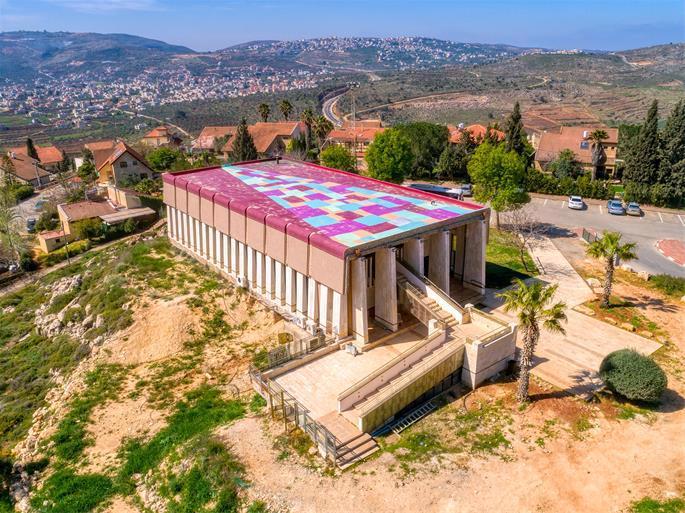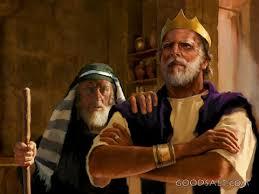Ao – Hannah’s Song First Samuel 2: 1-11
Hannah’s Song
First Samuel 2: 1-11
Hannah’s song DIG: Who were Hannah’s enemies? How was she delivered? What three ways show her transformation? Who did Hannah rejoice in? How did Hannah describe God in her song? What are some of the things she says that God does? How did the LORD continue to bless Hannah? How does Hannah’s song describe His sovereignty? How is Hannah’s understanding of God’s control different from the world’s?
REFLECT: What is most inspiring or instructive to you in Hannah’s praise and prayer? Why is that? Do you value God only for what He can do for you? Do you sometimes feel disappointed that God didn’t do what you thought He should do for you? What is the remedy for that disappointment? Where in your life now are you inclined to trust in your own strength instead of God’s? What has been your greatest role reversal?
Hannah’s song provides a forward-looking summary
of what ADONAI was about to do in her period of history and ours.
After Hannah left Samuel with ‘Eli, she could have gone off alone and had a good cry; but instead, she burst into a song of praise to ADONAI. The world doesn’t understand the relationship between sacrifice and song, how God’s people can sing their way into sacrifice and sacrifice their way into song. And when the burnt offering began, the song of ADONAI began also (Second Chronicles 29:27). Before going to the Garden where He would be arrested, Yeshua sang the Hallel with His apostles (Matthew 26:30), and Paul and Silas sang songs to the Lord after they had been humiliated and beaten (Acts 16:20-26).49
We become especially aware of the importance of Hannah’s song when we see how perfectly it corresponds to David’s song of praise (see the commentary on the Life of David, to see link click Eh – David’s Song of Praise). These two praise songs serve as a pair of bookends to cover everything written between them. The themes Hannah anticipated in the birth of Samuel reappear as David looked back to see Hannah’s hope wonderfully fulfilled through his own reign. For both Hannah and David, the God of Isra’el was their Rock. What Hannah foresaw that the LORD would do; David celebrated as accomplished.50
 Hannah’s God (2:1-2): Then Hannah prayed, saying: My heart rejoices (Hebrew: alats, meaning to feel extreme joy) in ADONAI! This is the first time rejoice(s) is used in the TaNaKh, as if the LORD kept it for this special occasion. Hannah showed us what a difference it makes when we turn to God in our time of need. The last time we saw her praying, her situation was very different. Hannah recorded her transformation in terms of her heart, her horn, and her mouth. First, earlier, her husband Elkanah had asked her, “Why is your heart so sad” (1:8a)? At that time Hannah described herself as a deeply troubled woman (1:15). But now she declared: My heart rejoices in ADONAI.
Hannah’s God (2:1-2): Then Hannah prayed, saying: My heart rejoices (Hebrew: alats, meaning to feel extreme joy) in ADONAI! This is the first time rejoice(s) is used in the TaNaKh, as if the LORD kept it for this special occasion. Hannah showed us what a difference it makes when we turn to God in our time of need. The last time we saw her praying, her situation was very different. Hannah recorded her transformation in terms of her heart, her horn, and her mouth. First, earlier, her husband Elkanah had asked her, “Why is your heart so sad” (1:8a)? At that time Hannah described herself as a deeply troubled woman (1:15). But now she declared: My heart rejoices in ADONAI.
Second, some English translations obscure Hannah’s next point, substituting the word “strength” for the original word horn. My horn has been restored by ADONAI! Those who lived in Hannah’s agricultural world knew that a beast held its horns high as a symbol of victory and power. In this same way, Hannah referred to the removal of her disgrace; now she could hold her head up high because of what YHVH had done for her.
Third, Hannah announced: My mouth speaks boldly against my enemies. The Hebrew literally says, “My mouth is wide open.” The ideas seem to combine the devouring of one’s foes, along with a gloating over defeated enemies. Given Hannah’s refusal to complain about Peninnah or to seek Ha’Shem’s revenge, it is unlikely that she had suddenly turned bitter and hateful. Rather, thinking theologically (as she does all the way through her song), Hannah saw Peninnah as an example of the enemies of the LORD and His people. Hannah rejoiced, as she saw the voice of unbelievers silenced because of God’s saving grace.51
A question is raised by some commentators as to whether Hannah overstated the significance of her own deliverance. The answer is that Hannah represented Isra’el in the barrenness of her wilderness wanderings. Her salvation was designed to encourage all Isra’el to hope for a greater deliverance. Looking at herself as representing the nation of Isra’el, she seems to have felt that what had happened to her on a small scale was to happen to the nation on a large scale. That ADONAI would redeem Isra’el as He had redeemed her (see the commentary on Romans Da – The Redemption of Isra’el); to make Isra’el His servant to humble the proud and malignant nations around her, and to rejoice in Him.52
It is of great importance that the source of Hannah’s joy and strength was ADONAI Himself. She stated: I rejoice in Your salvation. Hannah did not merely rejoice that she had received something she wanted. More significant than the gift in her eyes was the Giver. ADONAI was her song and her salvation. The object of Hannah’s delight was neither in herself (that she had overcome the disgrace of barrenness), nor in her son. Instead, her delight was in ADONAI, who was the source of both her, her son, and her salvation. As much as Hannah loved her son, he was not her Savior, and he could not provide the salvation for God’s people that she sought. Salvation is always of the Lord, and our praise should be focused on Him rather than merely on the blessings He has provided. Hannah had not merely received a son – as if a baby would solve all her problems – but had received help from God. He was the solution for everything Hannah and Isra’el needed.53
Just as Hannah earlier was a model of heartfelt prayer, she now models godly praise, glorifying God, first for who He is, and then being in awe at the salvation He has given. Her first thought turned to the LORD’s holiness. For no one is as holy as ADONAI. This is entirely appropriate, because it is God’s holiness that comforts and encourages us in every situation. The holiness of God implies His separation from all His creatures, but it especially carries the idea of Ha’Shem’s moral perfection. Since YHVH is holy, all His intentions for His people are holy. It is not possible for God’s motives to be perverse or callous or mean. Even in judgment, especially toward His own people, His eyes are too pure to look upon evil; he cannot tolerate wrong (Habakkuk 1:13).54 To the wicked this attribute does not bring comfort, only fear. Yet to those who can appreciate it, God’s holiness is such an incredible blessing. There is no darkness in Him, no corruption, no infirmity; being absolutely pure, He governs with absolute purity.55
Having praised God for His holiness, Hannah added: There is none to compare with You. Hebrew poetry often uses parallelism in which one statement is followed by another that develops and expands the initial thought. Not only is God holy, but He is so unique that no one else can compare with Him. The God of Abraham, Isaac, and Jacob is the only true God, alone among all those worshiped as divine, yes, Hannah’s LORD was truly God. Therefore, there is none to thwart His marvelous plans; ADONAI’s will is always being done, since there is none to compare with Him.
Then Hannah came to the culmination of her song/prayer. Not only is ADONAI holy and the only true God, but Hannah declared: There is no Rock like our God (2:2c). The Rock is one of the repeated images of YHVH in the Song of Moses (Deut 32:4, 15, 18, 30-31) and in David’s Song (2 Samuel 22:32). The Rock speaks of the LORD’s strength, stability, and chesed (see the commentary on Ruth Af – The Concept of Chesed), and emphasizes the fact that He does not change (Malachi 3:6). ADONAI is the immovable Rock on whom all our hopes are safe and secure. He is the Rock in which we can always trust, because He cannot be overthrown.
Hannah’s God-centered prayer sets a vital example for us. If we place a greater emphasis on the blessings that ADONAI gives than on YHVH Himself, we commit idolatry, placing more value on ourselves rather than on Him! Thus, our foolishness will eventually lead to our own destruction. Hannah was right. There is no one as holy as ADONAI. Therefore, like Hannah, we should always focus on the fact that we know God and have been accepted into His loving care through the atoning sacrifice of His one and only Son, Yeshua (John 3:16).
Hannah’s Warning (2:3): In a rebuke to scornful mockers, Hannah declares: Stop your proud boasting or you will be humbled! Don’t let arrogance come from your mouth! For ADONAI is a God of knowledge (He knows what you are thinking), and He appraises actions (He will judge). There’s no place for pride and arrogance when you stand before a God who knows you through-and-through, everything you’ve ever thought, spoken, and done! He heard all of Peninnah’s haughty words spoken against Hannah, and He also heard Hannah’s prayer from her heart.56 She was filled with the knowledge of God, her faith was anchored in His character and attributes. This was not only Hannah’s hope and joy, but as Jeremiah would later put it: Let the one who boasts boast about this: that they have the understanding to know Me, that I am the LORD, who exercises kindness, justice and righteousness on earth, for in these I delight,” declares the LORD (Jeremiah 9:24).
Hannah’s relationship with ADONAI exposes those who show little interest in the Lord. Do you come to your place of worship primarily to meet God? Or, is your primary concern in a message with some practical value to yourself? If that is the case, then you are missing the point. If we desire a faith that burns even in dark places and a character that honors YHVH at all times, our faith should be focused on the Lord Himself, seeking first the Kingdom of God, who gives eternal life (John 17:3).57
Hannah’s Judge (2:4-7): Hannah rejoiced because she knew that ADONAI is a just Judge. Unlike the people involved in human judicial proceedings, the LORD knows everything and is able to weigh us and our actions perfectly. God is able to weigh us and our actions correctly. He weighed Belshazzar and found him wanting (Dani’el 5:27). Ha’Shem weighs our motives (Provebs 16:2) and our hearts (24:11-12), and His scales are always accurate. Like Hannah, we may be misunderstood by others, but our Lord will always act justly.58
The bows of the mighty are broken, while the feeble are armed with strength. The well-fed hired themselves for bread, while those who were hungry hunger no more. The barren woman has borne seven, while the mother of many wastes away. ADONAI makes poor, and He makes rich; He humbles, and He exalts (2:4-5 and 7). This, of course, related to Hannah’s personal situation. The LORD continued to bless Hannah with five more children: three sons and two daughters (2:21). But then why does the Bible say the barren woman has borne seven? The point, expressed poetically, is that ADONAI had thoroughly blessed the one who was barren, with seven being the symbolic number for fullness of blessing (Ruth 4:15). God is to be praised because He lifts up the lowly and casts down the arrogant and ungodly.
According to Hannah, the Lord’s salvation involves a reversal of fortune in which the proud and violent are humbled and the poor and meek are lifted up. This was the very message taught by Yeshua when He said: Blessed are the poor in spirit, for theirs is the Kingdom of heaven . . . blessed are the meek, for they will inherit the earth (Matthew 5:3 and 5). God is to be praised because in a world where it seems that the rich get richer and the poor get poorer, ADONAI takes up the cause of the downcast, and gives salvation to the weak. Then Hannah expanded her thought to God’s salvation as it pertains to the ultimate issues of life and death. ADONAI kills and makes alive; he brings down to the grave, and he brings up (2:7). In a world such as ours, in which we all must face death – a world where anyone can suddenly become poor, sick, needy, and lowly – YHVH wonderfully lifts His people from death to life.59
Hannah’s Prophecy (2:8-10): Those reflections led Hannah to prophesy: He raises the poor from the dust, lifts up the needy from the trash pile; He gives them a place to sit with princes and assigns them seats of honor in the Messianic Kingdom. For the earth’s pillars belong to ADONAI because He is sovereign; on them He has placed the world. He will guard the steps of his faithful, but the wicked will be silenced in darkness. For it is not by strength that a person prevails – those who fight ADONAI will be shattered; he will thunder against them in heaven – ADONAI will judge the ends of the earth (see the commentary on The Life of Christ Jy – The Sheep and the Goats).
Perhaps it was because Hannah’s thoughts had turned to God’s judgment, in which every one of us is rightly condemned as a sinner, that she concluded her prophecy with a remarkable reference to God’s King and promised Messiah. He will strengthen His King and enhance the power of His Messiah (Hebrew: mashiach). This highlights the importance of Hannah’s song as an introduction to the books of Samuel. Whether through some insight from the Scriptures or through the prophetic inspiration of the Ruach Ha’Kodesh, Hannah foresaw that YHVH would provide the King of kings to rule on His behalf. The chapters that follow tell the story of how Hannah’s near historical prophecy was fulfilled with the coming of David (see the commentary on The Life of Christ Ai – The Genealogies of Joseph and Mary).
Hannah’s song is the first direct reference in the TaNaKh to God’s promised Messiah. How appropriate that this promise should come from her lips! Who better to foretell God’s gift of His one-and-only-son to be the Savior of sinful mankind, than a woman who freely gave her firstborn son to serve ADONAI and minister in His Name. How appropriate, as well, that Hannah’s song would find its counterpart in the B’rit Chadashah in the song of a godly young woman so much like her . . . the virgin Mary. Moved by the Spirit of God, Hannah’s song became the basis for Mary’s song (see The Life of Christ An – The Song of Mary). Hannah believed that the birth of her son foreshadowed a new day of hope for the righteous of the TaNaKh. Mary came to realize that through the birth of her Son would come the hope of all the world. While Samuel would be a great prophet and judge for Isra’el; Messiah’s would be the Savior of all who would place their faith in Him, for whoever believes in Him shall not perish but have eternal life (John 3:16).
How else, after all, can God lift up the poor and save the condemned, except that His own Son became poor for us, and the One who knew no sin was made sin so that in Him we might become the righteousness of God (see the commentary on Second Corinthians Bf – Fifteen Words of Hope). Hannah’s far eschatological prophecy has come near to us all through the coming of Yeshua, the promised Messiah. It is now in His Name that the feeble are armed with strength (2:4). It is now that those who were hungry, hunger no more (2:5), since, as Yeshua said: For the bread of God is He who comes down from heaven and gives life to the world . . . I am the bread of life (John 6:33 and 35). Therefore, whoever believes in Yeshua as God’s King and Messiah will be given, as Hannah foresaw, a place to sit with princes and assigned a seat of honor in the Messianic Kingdom (2:8). For as Yeshua taught, whoever hears My Word and believes in Him who sent Me has eternal life (see The Life of Christ Ms – The Eternal Security of the Believer).60
Postscript (2:11 and 26): Then Elkanah (and Hannah) went home to Ramah, with joyful hearts and great expectation to see what YHVH would do. What a wonderful thing it is when a husband and wife are dedicated to the Lord, worship Him together, pray together, and trust His Word. Hannah went to the place of worship with a broken heart, but God gave her peace because she prayed and submitted to His will.61 But Samuel ministered before ADONAI, as far as his age permitted, under the direction of ‘Eli the high priest. And the boy continued to grow in stature and in favor with ADONAI and with men, an appropriate description of a son, like Mary’s, who had come as a blessing of God to the world (Luke 2:52).62 This sets the stage for Samuel’s call (see Av – Here I Am).
Dear heavenly Father, praise You that You are always listening to the prayers of those who believe in You. Hannah was not an influential leader. She was only a young woman with a big burden on her heart, and You heard and You answered her! You are such a gracious and loving heavenly Father who delights in caring for and guiding Your children. Messiah Yeshua encouraged His children to continue to pray, for their heavenly Father hears and will help. Then Yeshua told them a parable to show that they should always pray and not be discouraged, He said: There was a judge in a certain city who neither feared God nor respected people. And there was a widow in that city who kept coming to him, saying, “Give me justice against my opponent.” He was unwilling at the time. But afterward he said to himself, “Although I don’t fear God or respect people, yet because this widow keeps bothering me, I will give her justice so she won’t wear me out by her incessant coming.” Then the Lord said: Hear what the unjust judge is saying. Won’t God do justice for His chosen ones, who cry out to Him day and night? Will He be slow to help them? I tell you, He will quickly give them justice. But when the Son of Man comes, will He find faith on the earth (Luke 18:1-8)? Thank You for being such a wonderful heavenly Father who hears and answers the prayers of those who believe in You! In Messiah Yeshua’s holy name and power of His resurrection. Amen




